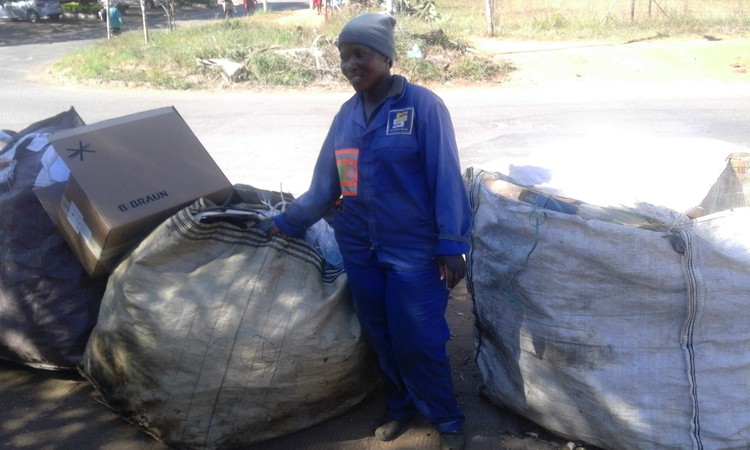
Rumbidzai Sheneti makes a living selling material for recycling in Louis Trichardt, Limpopo. Photo: Bernard Chiguvare
6 June 2019
“I had to think outside the box after my husband, a teacher, deserted me and my two children in 2008,” says Rumbidzai Sheneti who makes a living selling material for recycling in Louis Trichardt, LImpopo.
Sheneti used to buy groceries and clothes in South Africa to sell in Zimbabwe. But continual changes in the black market exchange rate and competition from other traders reduced her profits, making it hard for her to support her family.
She came to South Africa in 2015 and lives in Tshikota township in Louis Trichardt with her two children, aged eight and 10. She is a trained dressmaker, but she worked as a domestic worker for a while. Her monthly wage of R1,500 was not enough.
“As I roamed the streets I noticed some women and teenagers, also from Zimbabwe, picking up empty cardboard boxes, plastic containers and paper for recycling. I joined them. During my first days I could not stand the smell from some of the containers, but I persevered,” she says.
When she first started in 2018, she was not sure where to find the material and made very little money. “I used to get as little as R160 for three days [collecting], “ says Sheneti. But now that she has got the hang of it, on average she makes R700 in three days.
On weekdays she gets up around 5am to prepare food for her children. She leaves home at 6am in search of recycling material. She gets most of the material from bins around town and near supermarkets. She carries it in bundles on her head and fills big bags near Shoprite in the city centre, making several trips. The bags are safe from robbers because several Zimbabwean teenagers, who have made their home under a tree nearby, watch over them.
“I have joined two other women also from Zimbabwe. When we feel we have collected enough for the day we call someone with a bakkie to transport the recycling,” says Sheneti. The women go with the driver to the municipal dump, where they are paid R1.30 per kilogram. The bakkie driver charges R100 a load.
She says Mondays, Tuesdays and Thursdays are the best days, because that is when most people do their shopping.
“Unless I am hired for a dressmaking job or someone donates a sewing machine, I will continue doing this for the sake of my children,” she says, adding that she will only return to Zimbabwe if the economy is stable.